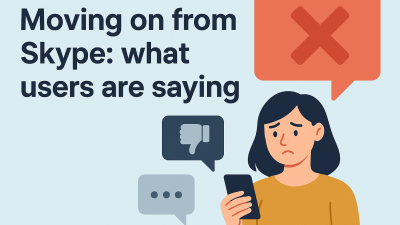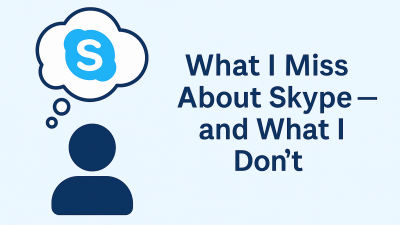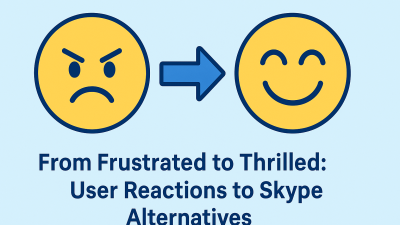Before the cloud, before WhatsApp, before Teams — there was Skype. It was the first time distance didn’t sound distant. You didn’t need a conference ID, a link, or an app install. You just logged in, clicked a name, and someone was there.
Now it’s ending. May 5, 2025.
That’s the date the servers go quiet.
And for a lot of people, this isn’t just a shutdown notice. It’s a farewell to part of their digital history. The calls that mattered didn’t happen on a stage. They happened on Skype — in bedrooms, hostels, cafés, basements, coworking spaces, hospitals, and classrooms.
The switch to Microsoft Teams doesn’t replace that. It only confirms what many already felt: Skype’s era is over. But the stories it held? They still matter.
The Call That Held Everything Together
A software engineer in Toronto used Skype to talk to his grandmother in Tehran every Thursday. Her landline couldn’t handle Zoom. Her email never worked. But she knew when she saw the little “S” icon flash, he’d be there. No missed birthdays. No language barrier is stronger than their routine.
That call never got saved. There was no cloud backup. But it was the one thing that made two worlds feel like one.
The Freelance Designer Who Built Her Career on a Webcam and Wi-Fi
Back in 2012, she was fresh out of college, living in a two-room flat in Bangalore. No portfolio site. No agency job. Just a Skype username in her email signature. She pitched clients from the UK, handled revisions from the US, and made her first thousand dollars using nothing but her voice and screen share.
Her first testimonial? Sent in a Skype chat.
Her first rejection? Delivered on Skype video.
Her entire start, not stored in Google Drive or Dropbox, happened through that blue interface.
Skype was never a tool. It was the room she worked in before she could afford an office.
Late Nights in Different Time Zones Still Count as Time Together
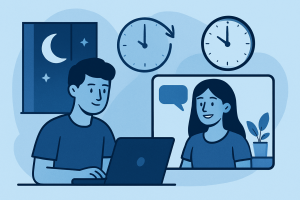
A couple in Berlin and Jakarta started out as classmates, then friends, then something more. They didn’t plan to fall in love, and they didn’t plan to stretch a relationship across 10,000 kilometers. But Skype made it possible.
They had a nightly call time. No alarms needed. Just habit and need. No filters. No effects. Just grainy screens, keyboard taps, and shared meals eaten miles apart.
They got married in 2020.
They kept Skype installed even after switching to other apps.
They didn’t want to delete the chat history. It held their early story, typed in imperfect English, timestamped and untouched.
The Guy Who Called His Dad After Every Job Interview
He didn’t always get the job. That wasn’t the point. After each interview, whether it was for a sales role in Dubai or a remote gig from Argentina, he’d call his father on Skype. No matter the time.
His dad never asked many questions. Just listened. Nodded. Said, “You’ll be fine.”
Those weren’t coaching sessions. They were check-ins. And they made the job hunt bearable.
His dad passed away last year.
The call history’s still there.
The Skype ringtone makes him pause when he hears it in a YouTube video.
That sound isn’t just nostalgic, it’s personal.
For Some, the Shutdown Already Happened Years Ago
One user said it best in a forum thread:
“Skype’s been dead since my contacts stopped logging in.”
The servers may stay on until May 5, 2025, but for many, the real silence came earlier. Friends moved to WhatsApp. Colleagues migrated to Slack. Businesses shifted to Zoom. And slowly, that green dot beside their contacts’ names disappeared — until it was just them.
They didn’t delete the app. They just left it installed. Like a room in the house nobody enters, but nobody locks either.
The shutdown doesn’t kill the community. It just puts a date on what people have already felt: this chapter is closed.
When You Realize the History Is Tied to the Platform
People aren’t just grieving a logo or an interface. They’re realizing how much of their personal digital history lives inside Skype:
-
The exact date they met someone
-
The call log before their first trip abroad
-
Entire conversations with parents, partners, friends — never saved elsewhere
-
Voice memos, photos, PDFs, and tiny inside jokes from five countries ago
And here’s the hard part: most of that won’t transfer to Teams. It won’t archive itself. Microsoft gave the option to export chats, but many didn’t know. Some thought they had more time. Some assumed it would be automatic.
Now, they’re opening the app and realizing: this is the only place those messages exist.
For them, Skype isn’t shutting down. It’s erasing something they weren’t ready to lose.
The Voices of People Who Didn’t Switch — and Now Feel Stranded
One woman posted in the Microsoft Community forum:
“I’ve been using Skype for 14 years. I’m not part of a team. I’m just someone who used it to call my mom every morning. Teams looks like a dashboard I don’t belong in.”
She’s not alone.
Thousands of users never needed Microsoft 365. Never joined group channels. Never cared about calendar integration. They used Skype because it let them talk without a tutorial.
Now they open Teams and see tabs for “Assignments,” “Planner,” and “Files.” It doesn’t speak their language. It speaks the language of work.
So they’re either being forced to adapt, or left out entirely.
The Quiet Problem No One Talks About: Trust
For some, this isn’t just the end of an app. It’s a trust breach. They built routines, relationships, even businesses around a tool they thought would be there. And now they’re watching it get pushed out, archived, and replaced — without much room for discussion.
There’s a difference between sunsetting a feature and sunsetting a platform that held people’s lives.
And while Microsoft offers Teams as a replacement, the reality is: Teams is not emotionally or functionally equivalent to Skype. It’s a different product. It has different expectations. It was never built for the same purpose.
So people are left trying to retrofit their lives into a platform that never asked to hold them.
What Some Users Are Doing Now — Quietly, Independently, Without Fanfare
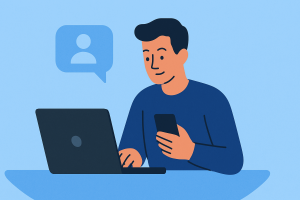
Some are exporting chats — the ones they can. Saving ZIP files. Printing messages as PDFs. Taking screenshots of conversations they can’t afford to lose.
Others are saying nothing, just installing other apps:
-
MyTello, for making international calls without fuss
-
Signal, for one-on-one private chats
-
Zoom, for long-distance conversations that still feel face-to-face
-
Or no app at all — just stepping back, simplifying, calling by phone
These aren’t dramatic exits. They’re quiet migrations. Done out of necessity, not preference.
What Doesn’t Transfer — and Why It Hurts More Than Expected
The hardest part of a shutdown like this isn’t the loss of features. It’s the realization that so much of what made Skype special wasn’t stored anywhere else:
-
Your contact nicknames
-
Your call durations
-
The sound of the ringtone that meant someone missed you
-
The goofy profile photo you never changed
-
The unread message from someone you don’t talk to anymore, but haven’t unfriended either
It’s the digital equivalent of a house you grew up in being sold.
You didn’t live there anymore. But you always thought you could visit.
Closure Looks Different for Everyone
Some users are nostalgic. Some are angry. Some are moving on without looking back.
But the most common emotion? Quiet recognition.
Skype had its flaws. It lagged. It got weird updates. It faded.
But it also connected people when nothing else could. And now, saying goodbye means honoring that, without pretending it’s still working.
Because the truth is, it worked when it mattered.
This Isn’t a Call to Action. It’s a Marker in Time.
There’s no sales pitch here. No list of better alternatives.
You can find those elsewhere.
This post isn’t about what to install next. It’s about what we built while Skype was still running.
It’s about the freelancers who found their first client.
The travelers who called home from five time zones away.
The couple who said “goodnight” through laptop screens.
The grandparents who learned to click one button — just one — to see your face.
Skype is shutting down. But what it gave isn’t gone.
You carry it forward. In new tools, in stronger routines, in the memory of that blue interface lighting up just when you needed it to.


